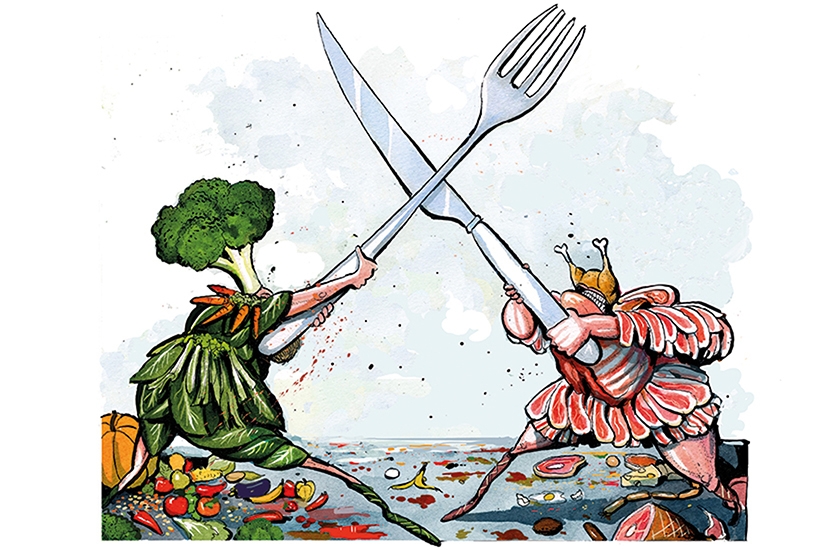It is mystifying to me that organic food is still widely seen as healthier, more sustainable and, most absurdly, safer than non-organic food.
Following the publication of part two of Henry Dimbleby’s National Food Strategy last week, the organic movement was quick to suggest that organic food and farming offer a way to achieve the strategy’s vision. ‘The recommendations of the National Food Strategy offer genuine hope that by embracing agroecological and organic farming, and adopting a healthier and more sustainable diet, we can address the climate, nature and health crises,’ said Helen Browning, chief executive of the Soil Association, Britain’s most vocal organic lobbying organisation. Browning also highlighted the strategy’s recognition of the Soil Association’s ‘Food for Life’ programme — essentially a vehicle to promote greater procurement and use of organic food in schools and hospitals.
The trouble is that scientific evidence indicates that the food safety risks of eating organic food are considerably greater than those of eating non-organic food. This is primarily because organic crop production relies on animal faeces as a fertiliser, an obvious vector for potentially lethal pathogens such as E.coli, but also because organic crops can be prone to harmful mycotoxins as a result of inadequate control of crop pests and diseases.
In his 2019 book The Myths About Nutrition Science, food and nutrition adviser David Lightsey cites an analysis of US Food and Drug Administration food safety recall data by Academics Review — a group of scientists dedicated to challenging anti-science claims — which showed that ‘organic foods are four to eight times more likely to be recalled than conventional foods for safety issues like bacterial contamination’.

Sadly the recall system is not always 100 per cent effective in protecting human health. In 2011, a major food poisoning outbreak in Europe which affected nearly 4,000 people, killing 53, was ultimately traced to organically grown bean sprouts from a farm in Germany that had been contaminated by a virulent E.coli strain, O104:H4.
Browning’s own organic meat company is currently at the centre of a listeria outbreak, with its organic corned beef being recalled just as Browning is publicly championing organic food as a healthier, more sustainable option. The Food Standards Agency notes that symptoms caused by listeria monocytogenes can be similar to flu and include high temperature, muscle ache or pain, chills, feeling or being sick, and diarrhoea. In rare cases, infections can be more severe, causing serious complications such as meningitis.
On the issue of sustainability, there are serious questions about whether a scaling-up of organic agriculture — Browning has called for Britain to exceed the EU’s Farm to Fork target of 25 per cent organic agriculture — would genuinely deliver environmental benefits.
The safety risks of eating organic food are considerably greater than those of eating non-organic food
Independent research published in Nature has shown that if England and Wales switched 100 per cent to organic it would actually increase the greenhouse gas emissions associated with our food supply because of the greater need for imports. Scaling up organic agriculture might also put at risk the movement’s core values in terms of promoting local, fresh produce and small family farms.
Browning was at the centre of reports earlier this year that her firm Helen Browning’s Organic had switched to procurement of organic pork from Denmark, sent to its processing factory in Germany before onward dispatch to UK supermarkets. To me, that sounds more like an industrial, multinational food business than ‘supporting British farmers’ as the company’s website claims.
To his credit, Dimbleby does not appear to have entirely fallen for the organic lobby’s rhetoric. His creative vision of a three compartment model for land use — allowing room for a combination of natural habitat, low-intensity farming and high-yield, hi-tech farming — follows the science and, if properly implemented, could deliver a more sustainable balance in terms of food production, resource use and environmental impact.
The strategy also notes that many households would not be able to afford to feed themselves at organic prices, with the premium for organic produce ranging from 11 per cent (for organic milk) to more than 400 per cent (for organic chicken).
Quite rightly, Dimbleby recognises that sustainably produced food in the future must look to innovation and new technologies — robots, drones, improved genetics and AI — to produce carbon-neutral and non-polluting food crops. And I remain hopeful as we chart our recovery from the Covid pandemic (a recovery made possible by the modern genetic technologies shunned and campaigned against by the organic lobby) that a more evidence-based approach to building a better food future will prevail.
Surveying the problems of traditional farming in his native India, a friend of mine, Professor Channa Prakash, once remarked: ‘Sure, organic agriculture is sustainable: it sustains poverty and malnutrition.’
I believe in freedom of choice, and I will defend an individual’s right to choose organic, but when it comes to protecting the health of the youngest and most vulnerable members of society — in our schools and hospitals — the demonstrable health risks of organic food outweigh any perceived sustainability benefits.






Comments